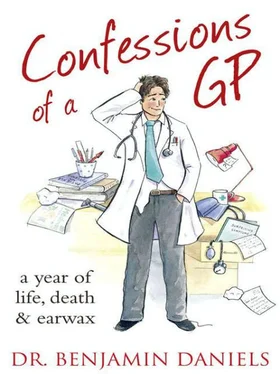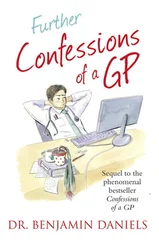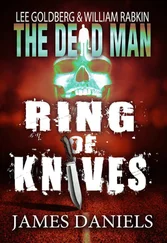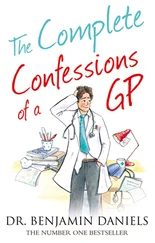Unfortunately, Michael didn’t just have man flu. There was something not quite right. He had already had three courses of antibiotics for recent chest infections and was losing weight. On closer inspection, he also had a white furry tongue that was almost certainly oral thrush.
Michael was 33 and a teacher at the local school. He was from Zimbabwe and had moved to England two years ago with his wife and baby daughter. His symptoms suggested a weakened immune system and I had to consider AIDS as a definite possibility. I discussed with Michael doing more blood tests. It is never easy bringing up the subject of HIV but it was important that I asked him directly about it and whether he felt he had ever put himself at risk. I talked to him about doing an HIV test and counselled him fully on what we would do if the result was positive.
Sexual health clinics are much better than GPs at managing HIV testing and I suggested that he attended our local walk-in centre. Michael looked horrified. Teachers tend to avoid the clap clinic as there is always a good chance that they’ll be sitting in the waiting room surrounded by their teenage pupils. Michael denied that he had ever put himself at risk but agreed to talk to his wife and come back the next day for me to do a blood test.
Michael missed his appointment. I wrote a letter and phoned twice but he never got back to me. I had a dilemma. Michael could well be HIV-positive but didn’t want an HIV test. He was, of course, completely within his rights to make this decision, but what about his wife and daughter? They could well be HIV-positive, too, and if diagnosed early, could potentially live long healthy lives on antiretroviral medication. I doubted strongly that Michael had spoken to his wife about his suspected diagnosis. The whole family were my patients so I had a duty of care for them all; however, I couldn’t break Michael’s right to confidentiality.
I was searching for a solution when one found me. Michael’s wife brought in their four-year-old daughter Cynthia to see me because of a lump on her neck. I had no idea if this lump was related to being HIV-positive or not, but it was an opportunity that I couldn’t miss. I talked with Michael’s wife about the many different causes for neck lumps in children, including AIDS, and discussed the option of a referral to the sexual health clinic for HIV testing. I wasn’t breaking Michael’s confidentiality but my actions did result in all three of them being tested. Unfortunately, the whole family tested HIV-positive with Michael and his daughter already having symptoms of AIDS.
I didn’t officially break Michael’s confidentiality but in some ways I did break his trust. He hasn’t come back to see me since but instead saw one of the other GPs at the practice. Michael and his wife and daughter were now on antiretroviral drugs and doing well. I feel I can ethically defend my actions; however, I do wonder if I would handle things differently next time. What a relief it was when my next young male patient with a cough and sore throat genuinely just had man flu.
I view alternative medicine a bit like I view prayer. I believe that both only work if you really have faith in them. They are also similar in the fact that neither can be explained by evidence or science, yet live on after thousands of years. My own personal belief is that both prayer and most alternative medicine practices only work via the placebo effect. However, as a doctor it is important that I put aside my personal reservations and accept that many of my patients believe in non-conventional forms of medicine. Trying to inflict my own scientific beliefs onto my patients just makes them feel defensive and alienated by modern medicine. I want my patients to feel that regardless of our differing views, they can always come and see me to discuss their health.
As a GP, patients often ask me what I think about specific alternative practices. It is important for me to tell them that they are not all the same. It would be rude to compare a chiropractor with a crystal therapist or a fully qualified herbalist with a faith healer. I am usually fairly non-committal on the subject and say, ‘If it works for you, then go for it.’ I am particularly keen not to put off my more difficult patients from trying alternative medicines, particularly if it means that they might be encouraged to not visit me quite so often.
One of the original founders of psychotherapy talks about the doctor being ‘a drug’. This is the idea that regardless of what we diagnose or what medicine we give, simply our spending time with a patient, listening to them and possibly reassuring them is in itself often an effective treatment for many ailments. This form of healing is perhaps being lost in the modern general practice of targets and ever shorter appointments. Regardless of whether they offer homoeopathy, acupuncture or Reiki healing, the alternative practitioners are filling that gap by giving the time and attention that GPs don’t have an opportunity to offer.
One gripe I have with alternative practitioners is that they are ultimately private. Somebody is making money out of your illness and having only ever worked for a free at point of access health service, I find that an uncomfortable concept. I am fortunate enough to have never had any problems with my back, but I am fairly sure that if I presented to a private chiropractor, he would examine me and diagnose me with various weaknesses and instabilities and then recommend a set of ten sessions for £50 a pop. I expect a lot of alternative practitioners do similar things. Doctors working in private practice are no better. I had a patient who returned from a skiing trip in Bulgaria. He had had an accident and injured his leg. The doctors did an X-ray to exclude a fracture, which is reasonable enough. They also did an ultrasound scan, a CT scan and prescribed five different medications. All this for a bad bruise! The doctors were playing on the patient’s fears of being unwell and fleeced him for a small fortune. Unfortunately, I think that many private doctors play this game and it is a real relief to me that I don’t have the temptation of earning more money by prescribing more drugs and ordering more tests.
Most of what I prescribe as a GP is based on evidence and I talked about this earlier in the book. The concept is that I can’t just give any medicine for any ailment. For me to use a medicine there has to have been a large non-biased trial that showed that this medicine worked better than a placebo. For some treatments such as homoeopathy these sorts of tests are fairly easy to carry out and most of the evidence would suggest that there is no difference between a homoeopathic treatment and a placebo. For other alternative treatments, conducting these sorts of trials is more difficult but it can be done. For those of you unfamiliar with Reiki, it consists of a specially trained Reiki ‘master’ laying his or her hands upon the patient and controlling the energy forces that pass through the body. Advocates of Reiki talk about the amazing feeling of a glowing radiance and heat that passes through them during a Reiki healing session. Apparently, an experiment took place where several actors watched a Reiki master perform and then they imitated his healing technique. When the actors impersonated the healer using realistic but completely made up mystical chants and movements, the patients were just as aware of the radiance and heat passing through their bodies and were unable to tell the difference between the work of the Reiki master and the actors.
Now I would be wrong to criticise a profession for healing via the placebo effect as I use placebos all the time for my patients. The important thing to remember is that placebos do work. As I said, I am fairly sure that anti-inflammatory gel is of no more benefit for chronic back pain than rubbing on a placebo gel. This would suggest that it is the process of rubbing the gel on and thinking that it is reducing the pain rather than any pharmacological properties of the gel itself that are working. However, whether you use a placebo gel or the real painkilling gel, the patient feels better than if they have no gel at all. This is how most alternative medicines work. The mind is an immensely powerful tool for healing and is used by conventional doctors and alternative practitioners alike. If we can convince our patients to have belief and faith in our treatments, the results can be astonishing.
Читать дальше
Конец ознакомительного отрывка
Купить книгу











![Benjamin Franklin - Memoirs of Benjamin Franklin; Written by Himself. [Vol. 2 of 2]](/books/747975/benjamin-franklin-memoirs-of-benjamin-franklin-wr-thumb.webp)
![Benjamin Franklin - Memoirs of Benjamin Franklin; Written by Himself. [Vol. 1 of 2]](/books/748053/benjamin-franklin-memoirs-of-benjamin-franklin-wr-thumb.webp)